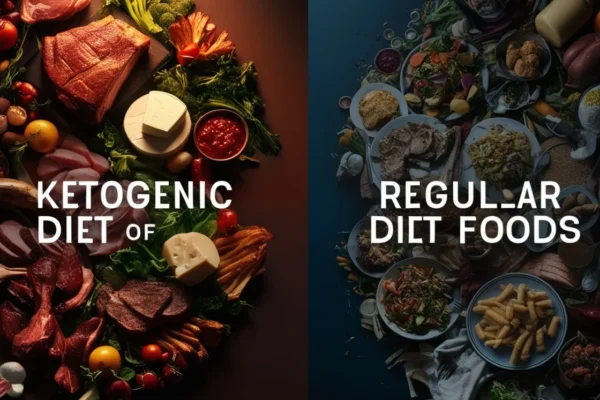Introduction to the Keto Diet
The ketogenic diet, commonly referred to as the keto diet, is a dietary approach that emphasizes high fat intake, low carbohydrate consumption, and moderate protein levels. By significantly reducing carbohydrate intake and replacing it with fats, the body enters a metabolic state known as ketosis. In this state, the body becomes incredibly efficient at burning fat for energy instead of relying on glucose from carbohydrates. This fundamental principle forms the backbone of the keto diet, leading to potential weight loss and various health benefits.
The history of the ketogenic diet dates back to the 1920s when it was initially developed as a treatment for epilepsy, particularly in children who did not respond to traditional medications. Over the decades, the diet has evolved and gained significant attention, particularly in recent years, due to its numerous potential health benefits, including weight management, improved mental clarity, and increased energy levels. Individuals are attracted to the keto lifestyle not only for weight loss purposes but also for its effectiveness in promoting metabolic health and controlling blood sugar levels.
A typical ketogenic diet primarily consists of healthy fats such as avocados, nuts, and olive oil, while drastically limiting foods rich in carbohydrates, including grains, sugars, and starchy vegetables. The moderate protein component of the diet often includes sources such as poultry, fish, and dairy products. This specific dietary composition leads to a unique metabolic process that can support weight loss goals and enhance overall well-being. As a result, the keto diet has gained immense popularity among various populations, including health enthusiasts, those aiming for weight loss, and even individuals seeking therapeutic benefits.
Health Benefits of the Keto Diet
The ketogenic diet, commonly referred to as the keto diet, is recognized for its numerous health benefits, attributed primarily to its unique macronutrient composition. By significantly reducing carbohydrate intake and emphasizing high-fat and moderate-protein foods, the body enters a state known as ketosis. In this metabolic state, the body becomes adept at burning fat for energy, which can lead to notable weight loss. Numerous studies indicate that participating in a keto diet can result in substantial weight reduction, making it a viable option for those struggling with obesity or looking to lose weight efficiently.
Beyond weight management, the keto diet has been associated with improved mental clarity and cognitive function. Research has suggested that ketones, produced during ketosis, serve as a powerful source of fuel for the brain. This alternative energy source may enhance focus, concentration, and overall mental performance, which can be particularly beneficial in today’s fast-paced environment. Reports from individuals adhering to this dietary plan often highlight positive changes in their ability to concentrate and think clearly, attributing these benefits to their dietary changes.
In addition to cognitive improvements, many individuals report increased energy levels after transitioning to the keto diet. This boost is often linked to the body’s more efficient fat-burning capabilities, allowing for stable energy throughout the day without the typical crashes associated with high-carbohydrate diets. Furthermore, the keto diet has potential therapeutic benefits for various medical conditions. Research supports its effectiveness in managing epilepsy, particularly in cases resistant to conventional treatment, and emerging evidence suggests it may play a role in managing diabetes and metabolic syndrome by improving blood sugar control and insulin sensitivity.
Overall, the keto diet presents a range of health benefits, supported by scientific research and various studies. From effective weight loss to enhanced cognitive function and potential therapeutic uses, adopting this low-carbohydrate, high-fat dietary approach can lead to meaningful health improvements for many individuals.
The Science Behind Ketosis
Ketosis is a metabolic state in which the body switches from burning glucose, its preferred source of energy, to burning fat. This process typically occurs when carbohydrate intake is significantly reduced, forcing the body to seek alternative energy sources. When carbohydrates are not readily available, the liver breaks down fatty acids into ketones, which serve as an efficient fuel source for the body and the brain.
During the initial stages of adopting a ketogenic diet, insulin levels decrease as glucose availability declines. Insulin is a hormone responsible for regulating blood sugar levels and promoting fat storage. Lower insulin levels facilitate lipolysis, the breakdown of stored fat, releasing fatty acids into the bloodstream. Concurrently, the liver converts these fatty acids into ketones, primarily beta-hydroxybutyrate, acetoacetate, and acetone. These molecules are adept at crossing the blood-brain barrier and providing energy for brain cells, a vital benefit of ketosis.
As the body adapts to this new fuel source, a variety of metabolic changes take place. Those on a ketogenic diet may experience improved energy levels, enhanced mental clarity, and reduced hunger due to the satiating nature of fats compared to carbohydrates. Additionally, sustaining ketosis can yield benefits such as increased fat oxidation, which is often a goal for individuals aiming for weight loss. It may also lead to improved insulin sensitivity, which is crucial for metabolic health.
In summary, the transition into ketosis marks a significant shift in the body’s energy utilization. By relying on fat-derived ketones rather than glucose, the ketogenic diet offers a unique approach to energy management and metabolic health, signifying its importance in contemporary dietary practices.
Getting Started with the Keto Diet
Embarking on the keto diet journey necessitates a structured approach to ensure its success. Before beginning, it is crucial for individuals to comprehend the fundamental principles governing a ketogenic lifestyle. The keto diet emphasizes a low-carb, high-fat intake, aiming to shift the body’s metabolism towards utilizing fat as its primary energy source. To facilitate this transition, prospective dieters are encouraged to conduct thorough research and consider consulting a healthcare professional or a registered dietitian.
Once you are informed about the basics, the next step involves meal planning. Creating a comprehensive meal plan can alleviate the challenges often associated with food choices on the keto diet. Focus on incorporating a variety of healthy fats, high-quality proteins, and non-starchy vegetables into your daily meals. Foods such as avocados, olive oil, grass-fed meats, and leafy greens should feature prominently in your dietary regimen.
Grocery shopping is a critical component of the keto diet. An effective strategy involves preparing a detailed shopping list to guide your purchases. When shopping, opt for whole, unprocessed foods. Stocking up on staples like eggs, nuts, coconut oil, and low-carb vegetables ensures that you remain prepared for the week ahead. Be mindful of hidden carbs in packaged foods, requiring close inspection of nutritional labels to avoid exceeding carbohydrate limits.
Transitioning to the keto diet can be challenging, particularly when adjusting to decreased carbohydrate intake. A gradual transition may be beneficial, allowing your body to adapt more comfortably to this new dietary approach. Start by reducing carb intake slowly, substituting high-carb items with keto-friendly alternatives. Furthermore, being aware of common pitfalls, such as cravings or nutritional deficiencies, can aid in maintaining adherence to the diet, helping you avoid potential setbacks on your journey towards improved health.
Common Challenges and How to Overcome Them
The ketogenic diet, while beneficial for many, is not without its challenges. One of the most frequently reported obstacles is the ‘keto flu,’ a collection of symptoms that may occur when the body adapts to a low-carbohydrate, high-fat diet. Symptoms such as fatigue, headache, nausea, and irritability can cause distress, especially in the initial stages of the diet. To combat these effects, it is crucial to stay well-hydrated and maintain a proper balance of electrolytes. Incorporating foods rich in potassium, magnesium, and sodium can significantly alleviate these symptoms. Additionally, taking supplemental electrolytes during the first few weeks can provide support as the body adjusts to its new metabolic state.
Another common challenge arises in social situations where high-carbohydrate foods are prevalent. Dining out or attending events can pose significant hurdles for individuals adhering to a ketogenic lifestyle. To navigate these social settings, preparation is key. Before attending events, one can check menus online to identify keto-friendly options or communicate dietary preferences to hosts. Bringing along snacks that adhere to the diet can also help manage cravings and maintain commitment during these occasions.
Cravings for carbohydrates often arise when switching to the keto diet, as many individuals are accustomed to a higher intake of these foods. Strategies to overcome these cravings include focusing on high-fat, low-carb alternatives that can satiate hunger and curb cravings, such as avocados, nuts, and cheese. Moreover, staying engaged in meal planning and trying new recipes can renew enthusiasm for the diet and create satisfaction with food choices. By employing these tactics, individuals can successfully navigate common challenges and remain steadfast in their commitment to the ketogenic lifestyle.
Keto Diet and Exercise
The relationship between the ketogenic diet and physical activity is a topic of increasing interest among fitness enthusiasts and health professionals alike. Adopting a keto diet, which emphasizes high-fat and low-carbohydrate intake, can have various effects on exercise performance. One significant aspect to consider is the body’s shift from using glucose as a primary energy source to relying on ketones produced from fat metabolism. This transition may initially affect stamina during high-intensity workouts, as glycogen stores become limited. However, many individuals report improved endurance over time as their bodies adapt to utilizing fat for fuel.
When determining the ideal types of workouts for those on a keto diet, low to moderate-intensity exercises, such as walking, cycling, or swimming, are often recommended. These activities align well with the fat-burning capabilities of a ketogenic lifestyle. Conversely, high-intensity training, which requires immediate energy from carbohydrates, may be less effective in the short term for those strictly adhering to keto. Incorporating strength training is equally important, as it helps preserve muscle mass, boosts metabolism, and enhances overall fitness, even within the constraints of a keto diet.
To optimize performance while adhering to a ketogenic lifestyle, fueling workouts properly is essential. Prior to exercise, individuals may benefit from consuming a small amount of healthy fats or low-carb snacks, which can assist in maintaining energy levels without disrupting ketosis. Post-workout recovery may involve a focus on protein intake to support muscle repair and building. In conclusion, integrating the keto diet with a structured exercise regimen can yield favorable outcomes for those aiming to enhance their physical fitness while maintaining a ketogenic approach. Such practices may help individuals maximize their performance and achieve their fitness goals effectively.
Keto-Friendly Recipes and Meal Ideas
Incorporating keto-friendly recipes into your daily meal plan is crucial for achieving the desired benefits of the ketogenic diet. A well-planned menu can help you maintain low carbohydrate intake while enjoying satisfying meals. Here are various delicious options across different meal categories, ensuring you never feel deprived.
For breakfast, consider starting your day with a cheesy spinach and egg bake. Simply whisk together eggs, heavy cream, sautéed spinach, and your favorite cheeses, then bake until golden. This dish is high in healthy fats while being low in carbs, making it an ideal keto breakfast. Alternatively, avocado and bacon egg muffins provide a portable option, combining wholesome ingredients with exceptional flavors.
For lunch, a hearty cobb salad featuring grilled chicken, crispy bacon, hard-boiled eggs, avocado, and a drizzling of olive oil vinaigrette can serve as a filling meal that complies with keto guidelines. For something warm, zoodles (zucchini noodles) topped with a creamy Alfredo sauce and shrimp offer a satisfying alternative to traditional pasta dishes.
Dinner can be a lavish affair with keto-friendly recipes such as cauliflower crust pizza, topped with mozzarella, pepperoni, and veggies, or a flavorful stuffed bell pepper filled with ground meat, cheese, and low-carb vegetables. Both options provide a comforting and appealing way to enjoy dinner without compromising your dietary goals.
For snacks, consider options like cheese crisps, guacamole served with celery sticks, or fat bombs made from nut butter and coconut oil. These snacks are not only easy to prepare but also satisfy cravings without veering off your keto path.
Finally, don’t forget dessert! Keto chocolate mousse and coconut flour cookies can satisfy your sweet tooth while remaining low in sugar. Remember, modifying traditional recipes by substituting high-carb ingredients with keto-friendly alternatives is the key to enjoying meals that align with the ketogenic lifestyle.
Myths and Misconceptions about the Keto Diet
The ketogenic diet, commonly known as the keto diet, has garnered significant attention and popularity in recent years. Unfortunately, this increased interest has also led to a proliferation of myths and misconceptions surrounding it. One of the most prevalent myths is that the keto diet can lead to unhealthy cholesterol levels. However, numerous studies have indicated that a well-formulated ketogenic diet may improve lipid profiles, including increases in HDL (good) cholesterol and reductions in triglycerides. The increase in saturated fats often associated with keto does not universally correlate with negative health outcomes, particularly when consumed as part of a calorie-controlled diet.
Another misconception is that the keto diet is unsuitable for athletes or individuals with active lifestyles. While it is true that the body primarily utilizes carbohydrates for high-intensity exercise, the adaptation to a ketogenic diet can enhance fat oxidation, allowing athletes to perform optimally during endurance activities. Many athletes have successfully integrated or transitioned to keto, reporting increased energy levels and better performance once their bodies adapt to utilizing fat as fuel efficiently.
Additionally, some people believe that the ketogenic diet lacks essential nutrients due to its restrictive nature concerning certain food groups. It is critical to understand that a well-maintained keto diet can be rich in vitamins, minerals, and fiber when structured wisely. Incorporating a variety of low-carb vegetables, nuts, seeds, and high-quality protein sources can help individuals meet their nutritional requirements. Moreover, supplementing with specific vitamins and minerals may further mitigate the risk of deficiencies.
Discrediting these myths is vital for fostering a more accurate understanding of the ketogenic diet. By relying on robust scientific evidence and expert advice, individuals can make informed decisions about their dietary choices and the potential benefits of adopting a keto lifestyle.
Conclusion: Embracing the Keto Lifestyle
As we have explored throughout this blog post, the keto diet represents a significant shift in how we approach nutrition and wellness in our daily routines. By drastically reducing carbohydrate intake and emphasizing healthy fats, the keto lifestyle can lead to numerous benefits, including weight loss, improved mental clarity, and enhanced overall health. Through scientific research and anecdotal evidence, we can conclude that the keto diet is not merely a temporary trend but rather a sustainable approach to long-term health management.
One of the key advantages of adopting the keto diet is its versatility and ability to fit into various lifestyles. Whether one is a busy professional, a parent juggling numerous responsibilities, or someone simply seeking to improve their dietary habits, the principles of keto can be tailored to meet individual needs. Additionally, the diet encourages the incorporation of a wide range of nutrient-dense foods, promoting better eating habits and potentially leading to improved health outcomes.
Moreover, the keto diet has shown promise in supporting individuals with specific health conditions, such as type 2 diabetes and epilepsy. Its potential to stabilize blood sugar levels and reduce seizure frequency highlights the importance of considering the keto lifestyle in medical and therapeutic contexts. The positive results experienced by many individuals can serve as an inspiration for those who are curious about its multifaceted advantages.
In conclusion, embracing the keto lifestyle can lead to significant improvements in both physical and mental well-being. As we navigate the complexities of modern diets and the increasing prevalence of processed foods, the keto diet offers a pathway toward healthier choices. We encourage readers to explore these benefits and consider integrating keto principles into their lives for a more fulfilling and health-promoting journey.






